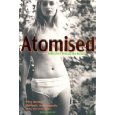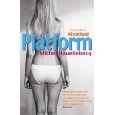
Volume XI, Issue 2 -- August, 2010
On Michel Houellebecq
by M.A.Orthofer
| Note: This piece was originally published in French translation in Le Monde, on 2 September 2010, as "Michel Houellebecq se replie complètement sur lui-même". |
The writer has always been a public figure, but in this personality-driven age his public image casts a particularly long shadow, often enveloping his work. Few are able to consistently and effectively tie together their own public image -- one that is often largely out of their control -- and their fiction. Novels that address contemporary issues can initiate public debate, and the writers of such works often join in the discussion, in the media and elsewhere. The attention has its appeal -- and furthers book sales. Soon enough it becomes easy to succumb to the temptation of incitement even before a book is published or widely read, or to range and rage beyond what the work itself would have prompted: for the past decade British readers have been able to follow as Martin Amis's increasingly desperate performance in the public eye have pushed him to the center of attention and his fiction to the wayside. Michel Houellebecq, famous for making similarly outlandish and scattershot public pronouncements -- and sharing many of Amis's preoccupations, such as sex and Islam -- has not yet suffered from the same disconnect: however preposterous or disturbing his opinions are, they are recognizably just another facet of his art and consistently align with the public image that he has shaped and that the media have adopted.
Houellebecq the public figure has emerged from behind his books: the author of Extension du domaine de la lute was just another author, albeit of an interesting book, while Les particules élémentaires was a sensation that pushed the writer into the spotlight. The fiction that has followed has always had to contend with the larger-than-life persona that it shares the stage with, but it could hold its own. Now, however, doubts begin to emerge. The exchange with Bernard-Henri Lévy, published as Ennemis publics, is self-indulgent, but can perhaps be excused as a folly, a newspaper debate expanded into book form. But what to make of La carte et le territoire, which features a character named Michel Houellebecq ? The author turns completely in on himself: a dangerous game. There have always been elements of autobiography in Houellebecq's fiction, but he has also always been careful to maintain some distance. He can no doubt make the same claim for La carte et le territoire, but with the character Michel Houellebecq staring back from its pages it no longer sounds as convincing.
The shift has been most obvious at the epicenter, but has also taken hold elsewhere on the continent: tellingly, the covers of most of the German paperback editions of his work picture Houellebecq himself in different poses. Here -- as in France itself -- it is already acknowledged and accepted that author and work are parts of a larger whole.




Meanwhile, the covers of the British paperbacks tend to feature bikini-clad and topless women, the publishers hoping to (misleadingly) entice with the promise of erotic and sexual satisfactions, while still trying to hide the disagreeable man of ideas behind the cover.



Paradoxically, part of Houellebecq's appeal has always been his disagreeableness, in person and in his writings. Assertive, loud, opinionated, all with a still distinctively French flair, Houellebecq is, on the international stage, a French writer for our time. He punctures French pretensions from within -- maintaining, all the while, a typical French arrogance. His writing bubbles with bright ideas, but he is often lazy in his thinking, and crass; his popularity allows one to believe -- with, no doubt, a smug sense of satisfaction -- that this is what the French public intellectual has degenerated into. And those jealous of and intimidated by French reputations for glamour and sensuality can take comfort in Houellebecq's contrary and relentlessly dark and solitary world-view, a world where sex has been stripped of almost all pleasure and is often little more than self-abuse.
Whereas in Europe Houellebecq's sense of anomie hits close to home and readers can relate more readily to the social commentary in his books, to Americans much of his foreign worldview still comes across as exotic and fantastical -- a sense reinforced both by Houellebecq's reliance on science fiction elements in several of his novels, as well as his critiques of America, all bluster and little sting, a foreign view easily discounted because of what seem, to American readers, like basic misconceptions. Not surprisingly, the arc of his career has been narrowest in the United States: after Extension du domaine de la lute -- published under the laconic title Whatever in English -- which barely registered, Les particules élémentaires impressed as a novel kind of nihilistic fiction on a much larger scale, so different from what audiences had come to expect from European authors. This was flawed but ambitious writing, and much more vigorous than most French fiction. It barely shook American foundations, but it shook French and European ones strongly enough to reverberate even across the Atlantic. The Houellebecq phenomenon was a fascinating spectacle to behold, and even in the United States the media and readers were carried away by it. At its height, La possibilité d'une île was hurriedly translated into English, published in the same season. Now, a mere five years later, Hourellebecq's routine seems only willfully provocative, at least from a distance; an English translation of La carte et le territoire will no doubt appear soon enough, but there is, not surprisingly, no great rush or clamor to get it to the American market.
Houellebecq remains unavoidable. The new novel will get attention even from the foreign media: it is an event, and worth paying attention to. He earned the attention with his earlier books. These provided a hearty, healthy shock. There was even something invigorating about his frustrating prose, constantly shifting between the lumbering and the inspired. Most of all, Houellebecq's audacity was exhilarating: his passionless characters and their inescapable isolation, his bleak and absolutely relentless nihilism, his enthralled obsession with unsatisfying sex. Yet now we have seen these characters resigned to the fates our time and failed societies impose on them in several variations, and it has come to feel like a dead end. His protagonists revel in their mediocrity and can only take futile stabs at shaking up their lives; they admit to their faults, not taking pride in these but also barely able to imagine any form of self-improvement.
Now it remains to be seen whether Houellebecq can move ahead in any constructive manner, or whether his books become mere echo-chambers; the prominent presence of the character Michel Houellebecq in La carte et le territoire suggests which path he is hurtling down.
- Return to top of the page -
Michel Houellebecq's books under review at the complete review: - Return to top of the page -
Current Issue | Archive | about the crQuarterly | the Literary Saloon | the complete review
© 2010 the complete review Quarterly
© 2010 the complete review
